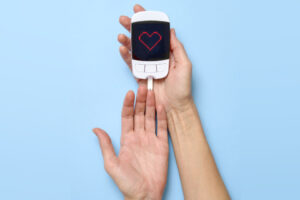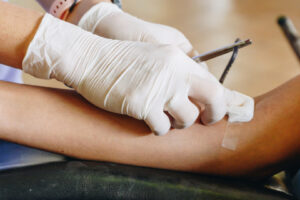While a heart attack doesn’t always look like how it’s portrayed on television, one thing is certain: it’s important to get to the nearest emergency department immediately if you experience symptoms.
“Some people have the crushing chest pain that’s often associated with a heart attack, but I always advise patients that if they’re experiencing the first onset of a symptom that seems strange, seek medical attention right away,”explains Jatinchandra Patel, DO medical director of the Robertshaw Cardiovascular Interventional Center at Atlantic Health CentraState Medical Center. “You may tell yourself it’s acid reflux, but a condition like GERD doesn’t just happen overnight.”
Signs of a heart attack can include:
- Chest pain
- Pain in the arms, abdomen or jaw
- A rapid or irregular heartbeat
- Shortness of breath
- A feeling of fullness or indigestion
- Nausea or vomiting
- Dizziness
In addition to these symptoms, women may sometimes have symptoms that are less typically associated with a heart attack, including:
- Upper back pain or pressure
- Upset stomach
- Shoulder pain
- Fainting
- Breaking out in a cold sweat
- Fatigue
Seeking Emergency Care
Calling 9-1-1 is just as important as recognizing symptoms, because the first hour while you’re having a heart attack is the most critical for starting treatment and initiating a procedure if needed. Quick intervention may stop a heart attack in its tracks and reduce the risk of permanent damage to the heart. (Watch our video “Can Heart Attack Damage Be Reversed?” on Youtube)
“We’ve seen instances where people drive to the hospital rather than calling 9-1-1, and then have a medical crisis on the way,” says Amy Quinlan, director of Cardiovascular Services. “Yet one call from an EMS team activates our treatment protocol, and we can even review the EKGs they perform in the field – all of which expedites care upon arrival. Those minutes all matter.”
A Fast-Acting Team
When a patient is transported by EMS to CentraState’s Emergency Department, everything is ready – from stat IVs and medications to diagnostic tests and rapid assessment by the team. A cardiac catheterization lab stands ready for emergency situations if an intervention like emergency percutaneous coronary intervention (PCI), also known as emergency angioplasty, is needed to treat a heart attack. In this minimally invasive procedure, the interventional cardiology team opens a narrow or blocked coronary artery using a catheter and a balloon, restoring blood flow to the heart without the need for surgery.
Research shows that the faster an artery is opened, the better the outcomes for patients. CentraState’s door-to-balloon time – the time between patient arrival and the opening of the artery – is consistently faster than the 90-minute national quality benchmark. In fact, it’s often under 60 minutes and was 10 minutes in one recent case.
CentraState is licensed by the New Jersey Department of Health for both emergency and elective (non-emergency) angioplasty. The hospital holds Chest Pain Center Accreditation and Cardiac Cath Lab Accreditation from the American College of Cardiology, meaning it adheres to the highest care standards. When advanced cardiovascular surgery like open heart surgery is needed, CentraState connects patients seamlessly to Atlantic Health Morristown Medical Center.
“Even if it’s not a heart attack, our interdisciplinary team is fully prepared to handle the vast majority of our community’s cardiovascular needs, from lifesaving interventions to cardiac rehabilitation to help patients recover after a cardiac event,” adds Dr. Patel. “We’re proud to offer this top-notch level of expertise close to home.”
CARDIOLOGY SERVICES AT CENTRASTATE
Learn more about CentraState’s cardiology services.





